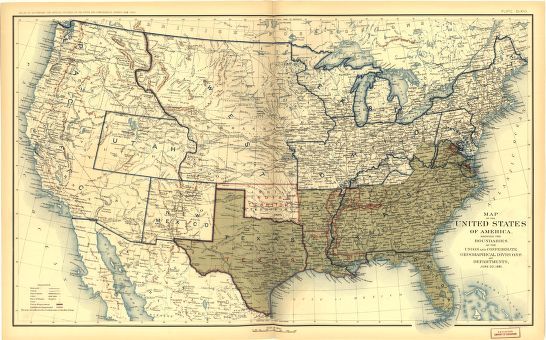 In December United States President Abraham Lincoln issued his Proclamation of Amnesty and Reconstruction. The edict signified the formal beginning of efforts to reconcile Southern citizens and states with the Union. Full pardons were extended to persons fighting against the Union, other than upper-level military leaders and Confederate officials. In addition, the proclamation provided a way for Southern state governments to be readmitted into the Union, dependent upon ten percent of eligible voters taking the oath of allegiance to the United States.
In December United States President Abraham Lincoln issued his Proclamation of Amnesty and Reconstruction. The edict signified the formal beginning of efforts to reconcile Southern citizens and states with the Union. Full pardons were extended to persons fighting against the Union, other than upper-level military leaders and Confederate officials. In addition, the proclamation provided a way for Southern state governments to be readmitted into the Union, dependent upon ten percent of eligible voters taking the oath of allegiance to the United States.
In conjunction with the yet fledgling Reconstruction efforts the U.S. War Department in the weeks following granted various Northern denominations permission to take control of their respective churches of the South that are currently devoid of ministerial leadership.
Today, following a petition from Baptists of the North, the War Department grants permission for American Baptists to fill vacant Baptist pulpits of the South.
War Department, Adjutant-General’s Office,
Washington, January 14, 1864.To the generals commanding the Military Division of the Mississippi, and the Departments of the Gulf, of the South, and of Virginia and North Carolina, and all generals and officers commanding armies, detachments, and posts, and all officers in the service of th United States, in the above mentioned Departments:
You are hereby directed to place at the disposal of the American Baptist Home Mission Society all houses of worship belonging to the Baptist Churches of the South, in which a loyal minister of said church does not now officiate. It is a matter of great importance to the Government, in its efforts to restore tranquility to the community and peace to the nation, that Christian ministers should, by example and precept, support and foster the loyal sentiment of the people. The American Baptist Home Mission Society enjoys the entire confidence of this Department, and no doubt is entertained that all ministers who may be appointed by it will be entirely loyal. You are expected to give it all the aid, countenance, and support practicable in the execution of its important mission.
You are also authorized and directed to furnish their executive officer, or agent, and his clerk, with transportation and subsistence when it can be done without prejudice to the service, and will afford them courtesy, assistance, and protection.
By order of the Secretary of War,
E. D. Townsend, Assistant Adjutant-General
This extraordinary government intervention in local church life takes place within the context of Lincoln’s belief that the states involved in the Rebellion are treasonous, foreign entities that are not entitled to the freedoms of loyal states. By returning Southern churches to U.S. citizens, the administration is restoring to churches the congregational freedoms guaranteed by the U.S. Constitution–a view that is quickly disputed by Confederate Baptists and other Confederate Christians who see in Lincoln’s actions yet more tyranny from the abolitionist North.
For their part, American Baptists are eager to begin the work of restoring churches in the South, noting that:
In almost every city, town, and village taken by our army there has been found a deserted meeting house. In many places these houses have been stripped of all that was movable, or converted into hospitals, stables, storehouses, or, perhaps, occupied by others than Baptists, who have denied us the privilege of using them as places of worship.
Northern Baptist enthusiasm even clothes itself in military language:
We are marching on with a tread that is shaking the very foundation of things. Hundreds of abandoned Baptist pulpits will be open to loyal Baptist Ministers of the North.
Little can the Lincoln administration realize that today’s executive order will further raise Southern Baptist anger toward their Northern brethren to such an extent that the animosity will characterize not only the remaining months of war, but also exist throughout the remainder of the nineteenth century.
Sources: “Church Property South,” in Annual Report, American Baptist Home Missionary Society, 1864, pp. 14-17 (link); New York Examiner, in True Presbyterian, June 9, 1864 (link)


